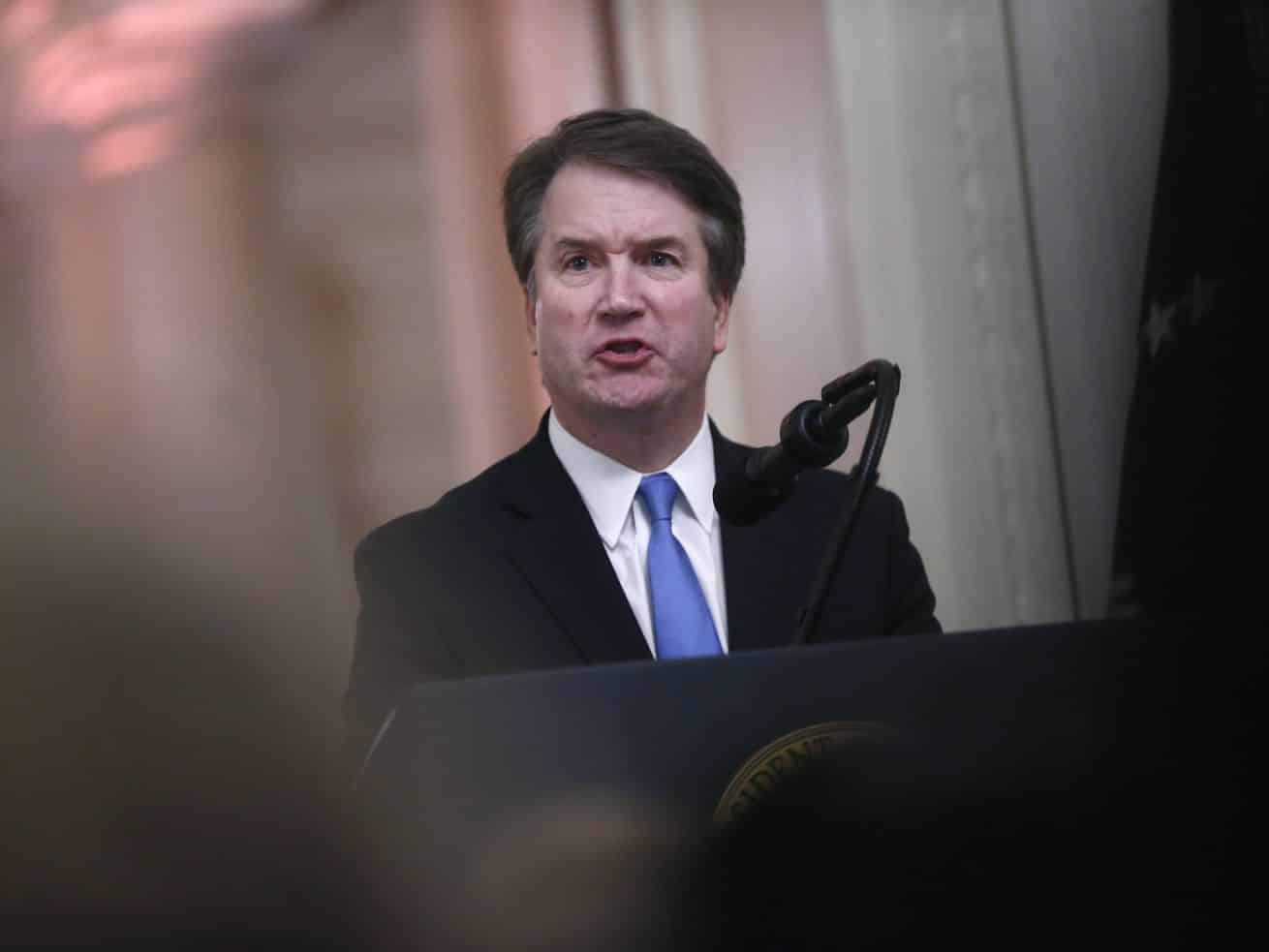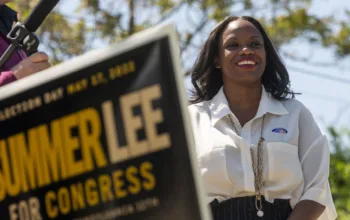Brett Kavanaugh hands the smallest possible victory to millions of Americans facing eviction.
The Supreme Court handed down a narrow 5-4 decision Tuesday night, which will nonetheless come as an enormous relief to millions of Americans who were at risk of losing their homes if the decision had gone the other way.
The Court’s order in Alabama Association of Realtors v. HHS concerns a temporary federal moratorium on many evictions, which was implemented in 2020 to prevent tenants who were behind on their rent from being evicted and then moving to friends’ couches, homeless shelters, or other places where they were more likely to interact with other people and potentially spread Covid-19.
The moratorium on evictions does not apply to all renters. In order to qualify, renters have to make several declarations under oath, including that they meet certain income requirements, that they cannot pay their rent “due to substantial loss of household income, loss of compensable hours of work or wages, a lay-off, or extraordinary out-of-pocket medical expenses,” and that they have no other housing options. Renters who take advantage of the moratorium still owe their landlords rent, and they can still be evicted for non-payment of that rent once the moratorium expires.
Although the moratorium will expire on its own terms on July 31, a group of landlords and realtors asked the Supreme Court to lift the moratorium early, effectively allowing landlords to start evicting many of their tenants right away. In a 5-4 decision, with Chief Justice John Roberts and Justice Brett Kavanaugh crossing over to vote with the three liberal justices, the Court denied this request — leaving the protections in place for another month. Kavanaugh, however, wrote a very brief opinion warning the Biden administration not to extend the moratorium beyond July.
The upshot, in other words, is that this is not much of a policy victory for tenants. Indeed, if anything, Kavanaugh’s opinion moves the law somewhat to the right on the question of whether federal agencies can take innovative steps to respond to a crisis.
Yet, while the decision in Alabama Association of Realtors is the smallest possible victory for renters, the Court’s decision to stay its hand in this case potentially saves millions from an immediate catastrophe. The moratorium is an imperfect policy — some evictions have proceeded even while it’s been in place — but it has played an important role in keeping people housed during the pandemic. More than 11 million Americans are behind on their rent, according to a May 31 report by CNBC. So, if even a fraction of these Americans qualify for relief under the eviction moratorium, they are now safe from eviction for another month.
The plaintiffs made an argument that was very likely to convince conservative judges
The moratorium arose out of an August 2020 executive order by then-President Donald Trump, which instructed the federal government to “consider whether any measures temporarily halting residential evictions of any tenants for failure to pay rent are reasonably necessary to prevent the further spread of COVID-19 from one State or possession into any other State or possession.”
A few weeks after this executive order was issued, the Centers for Disease Control and Prevention issued a temporary moratorium on evictions that was originally slated to expire at the end of 2020 — it’s been extended several times since then, both by the CDC and by Congress.
As legal justification for issuing such a moratorium, the CDC pointed to a federal law, which permits the agency to “make and enforce such regulations as in [its] judgment are necessary to prevent the introduction, transmission, or spread of communicable diseases.”
It’s a fairly sweeping delegation of power to a federal agency, and one that seemed designed to incite conservative judges — including a majority of the justices on the Supreme Court — who have indicated that they want to shrink Congress’s ability to delegate regulatory power to agencies, and also that existing statutes giving power to agencies should be read narrowly.
Under existing law, there are strong legal arguments that the CDC acted within its authority when it issued the moratorium. As the Supreme Court explained in Mistretta v. United States (1989), Congress has broad authority to delegate regulatory power to federal agencies, and the Constitution permits such delegations of power so long as Congress lays down “by legislative act an intelligible principle to which the person or body authorized to [exercise the delegated authority] is directed to conform.”
Thus, under Mistretta there was a strong argument that the CDC moratorium is legal. Congress delegated broad public health authority to a federal agency, but it did lay down an “intelligible principle” to guide the use of that authority. The CDC could only make regulations that it deems necessary to “prevent the introduction, transmission, or spread of communicable diseases.”
But at least five members of the current Supreme Court have previously signaled that they disagree with Mistretta and that they wish to place much stricter restrictions on Congress’s ability to delegate regulatory authority to federal agencies. Broad delegations of power, Justice Neil Gorsuch wrote in an influential dissenting opinion in 2019, are highly suspect. It’s more important to prevent federal agencies from having “unbounded policy choices” than it is to give them the flexibility to govern. Now, with a 6-3 conservative majority on the Court, that dissenting opinion is much more likely to guide a future decision.
And so, the landlords and realtors in Alabama Association of Realtors argued that the CDC’s moratorium raised “serious constitutional concerns” because of the “breathtaking scope” of the statute permitting the CDC to declare this moratorium. They also argued that the statute should be read narrowly in a way that would limit the CDC’s authority.
In short, they made a case that would appeal to the current Court.
The plaintiffs lost, despite five justices agreeing with their legal arguments
Four justices — Clarence Thomas, Samuel Alito, Neil Gorsuch, and Amy Coney Barrett — would have granted the Alabama Association of Realtors plaintiffs the relief they sought. Meanwhile, Kavanaugh wrote an unusual one-paragraph opinion explaining that he agreed with the plaintiffs that the CDC’s order is illegal, but that he was denying relief to them anyway.
The most likely reason for Kavanaugh’s unusual approach stems from the fact that this case arose on the Court’s “shadow docket,” a mix of emergency orders, responses to stay requests, and other decisions that are typically handed down without full briefing or oral argument.
Traditionally, the Supreme Court has been reluctant to hand down significant, precedent-setting cases on its shadow docket, because of the risk that it will release a sloppy or ill-considered opinion if it moves too quickly. As Justice Sonia Sotomayor warned in a 2020 opinion, shadow docket cases “force the Court to consider important statutory and constitutional questions that have not been ventilated fully in the lower courts, on abbreviated timetables and without oral argument.”
But this Supreme Court has not always honored this tradition. Since Barrett joined the Court last fall, giving Republican appointees a 6-3 majority, the Court handed down a series of shadow docket opinions that revolutionized much of its religion jurisprudence — handing historic victories to the religious right in the process. Kavanaugh supported these sweeping decisions.
Nevertheless, in Alabama Association of Realtors, Kavanaugh appears to have decided to take a more modest approach. Although Kavanaugh agreed with a lower court which ruled that the CDC “exceeded its existing statutory authority by issuing a nationwide eviction moratorium,” he ultimately decided to let the moratorium expire on its own accord at the end of July.
He added that “clear and specific congressional authorization (via new legislation) would be necessary for the CDC to extend the moratorium past July 31.”
Thus, while Kavanaugh avoided the immediate disruption of halting the moratorium right away, he’s prepared to cast the fifth vote to strike down any future effort to extend the moratorium unless Congress acts.
Author: Ian Millhiser
Read More



